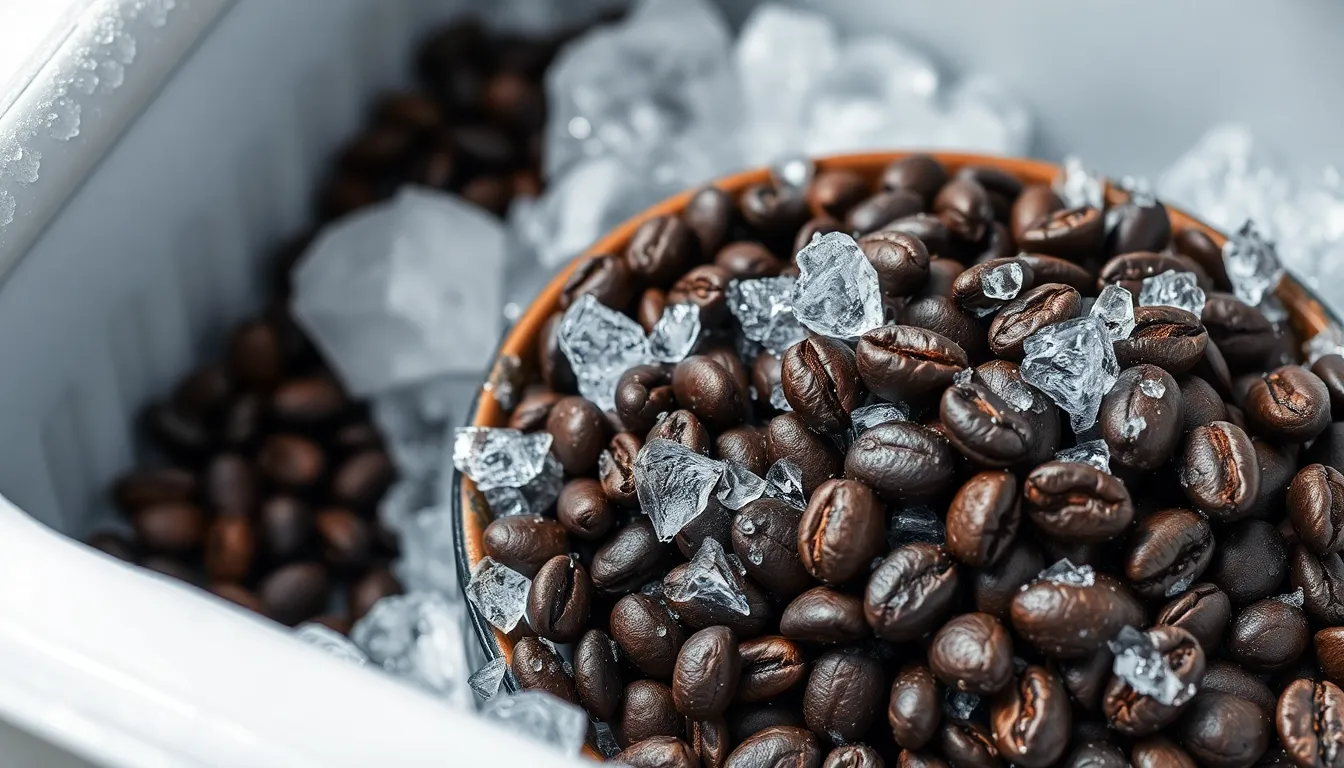Wondering how long does coffee last in the freezer? If you’re a coffee lover who’s stocked up on your favorite beans or grounds, you’ll want to know exactly how to preserve that fresh flavor and aroma for as long as possible.
Freezing coffee can be a smart way to extend its shelf life, but timing matters. When stored properly, coffee can maintain its quality in your freezer for anywhere from 1-3 months for ground coffee and up to 4 years for whole beans. But, several factors affect this timeline, including packaging, freezer temperature, and how often you’re accessing your coffee stash. Let’s explore how to maximize your frozen coffee’s lifespan and keep those morning brews tasting their best.
Understanding Coffee Preservation in the Freezer
Freezing coffee extends its shelf life by slowing down the degradation process that affects flavor and aroma. Cold temperatures in your freezer significantly reduce the oxidation rate, preserving the essential oils and compounds that give coffee its distinctive characteristics. The freezer environment creates a protective barrier against three primary enemies of coffee freshness: oxygen, moisture, and heat.
Coffee beans contain hundreds of volatile compounds that contribute to their complex flavor profile. When these compounds interact with oxygen, they break down and cause the coffee to taste stale. Freezing temperatures between 0°F and -10°F (-18°C to -23°C) minimize this chemical reaction, keeping your beans fresher for longer periods.
Proper packaging plays a crucial role in freezer preservation. Airtight containers prevent freezer burn and moisture absorption while blocking external odors. One customer, Sarah from Portland, shared her experience: “I’ve been storing my specialty Ethiopian beans in vacuum-sealed bags in the freezer for months, and they taste almost as fresh as the day I bought them.”
Coffee’s porous structure easily absorbs surrounding odors, making proper sealing essential. Many coffee enthusiasts use double-bagging techniques with freezer-safe zip-lock bags to create an additional protective layer. Removing excess air before sealing helps maintain flavor integrity throughout the storage period.
Temperature fluctuations damage coffee quality over time. Each time you open your freezer, the temperature briefly rises, potentially causing condensation on frozen beans. This moisture accelerates deterioration once reabsorbed into the coffee. Storing your coffee in the back of the freezer minimizes exposure to these temperature changes during regular freezer access.
Whole beans preserve better than ground coffee due to reduced surface area exposure to environmental factors. The intact structure of whole beans protects the inner compounds from breaking down as quickly, maintaining flavor notes and aromatic qualities for extended periods.
AI:
Understanding Coffee Preservation in the Freezer
Freezing coffee extends its shelf life by slowing down the degradation process that affects flavor and aroma. Cold temperatures in your freezer significantly reduce the oxidation rate, preserving the essential oils and compounds that give coffee its distinctive characteristics. The freezer environment creates a protective barrier against three primary enemies of coffee freshness: oxygen, moisture, and heat.
Coffee beans contain hundreds of volatile compounds that contribute to their complex flavor profile. When these compounds interact with oxygen, they break down and cause the coffee to taste stale. Freezing temperatures between 0°F and -10°F (-18°C to -23°C) minimize this chemical reaction, keeping your beans fresher for longer periods.
Proper packaging plays a crucial role in freezer preservation. Airtight containers prevent freezer burn and moisture absorption while blocking external odors. One customer, Sarah from Portland, shared her experience: “I’ve been storing my specialty Ethiopian beans in vacuum-sealed bags in the freezer for months, and they taste almost as fresh as the day I bought them.”
Coffee’s porous structure easily absorbs surrounding odors, making proper sealing essential. Many coffee enthusiasts use double-bagging techniques with freezer-safe zip-lock bags to create an additional protective layer. Removing excess air before sealing helps maintain flavor integrity throughout the storage period.
Temperature fluctuations damage coffee quality over time. Each time you open your freezer, the temperature briefly rises, potentially causing condensation on frozen beans. This moisture accelerates deterioration once reabsorbed into the coffee. Storing your coffee in the back of the freezer minimizes exposure to these temperature changes during regular freezer access.
Whole beans preserve better than ground coffee due to reduced surface area exposure to environmental factors. The intact structure of whole beans protects the inner compounds from breaking down as quickly, maintaining flavor notes and aromatic qualities for extended periods.
Shelf Life of Different Coffee Types in the Freezer
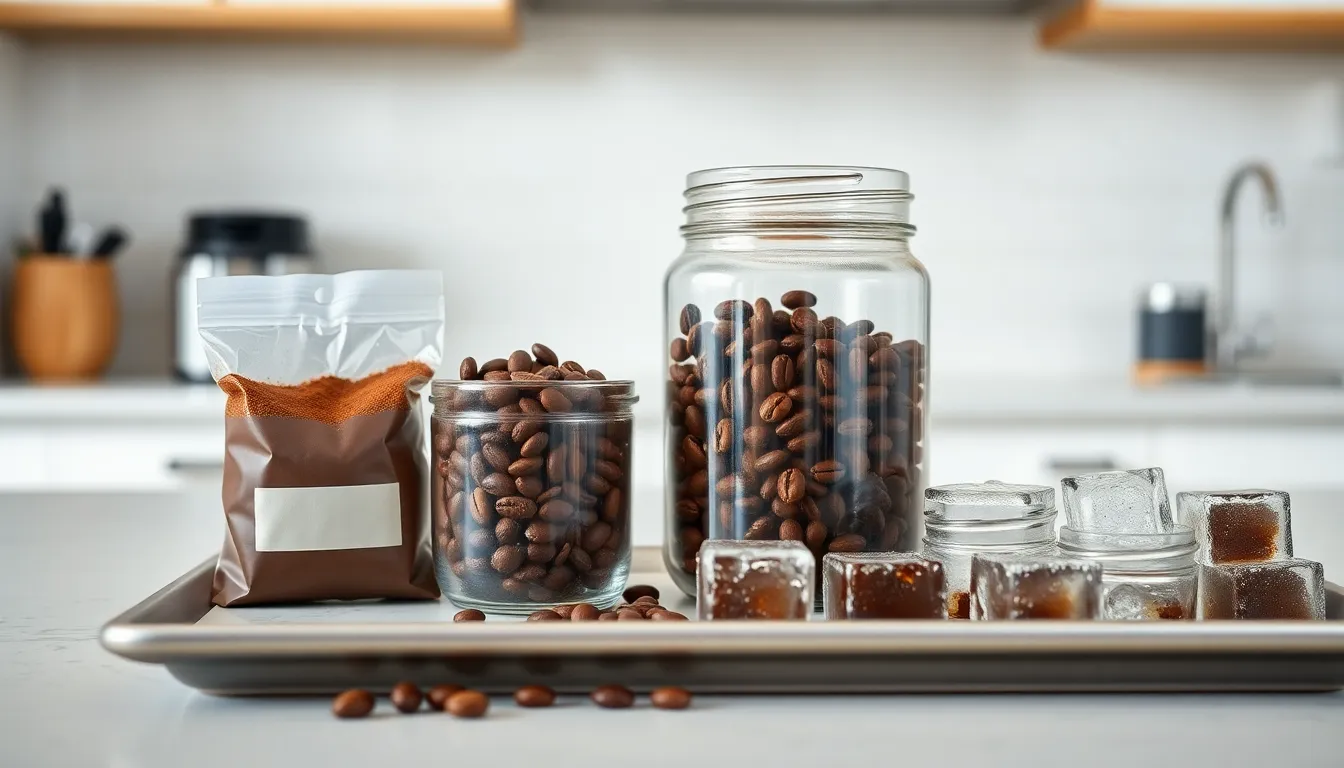
Freezing coffee extends its shelf life by slowing down the oxidation process that degrades flavor and aroma. Different coffee forms have varying longevity when stored in freezer conditions, with proper storage techniques significantly impacting quality retention.
Ground Coffee Storage Duration
Ground coffee typically lasts a few weeks in the freezer when stored properly. Its increased surface area makes it more vulnerable to moisture absorption and odor contamination compared to whole beans. For optimal preservation, store ground coffee in completely airtight, opaque containers that prevent exposure to air, light, and freezer odors. The finer particles in ground coffee create more pathways for flavor degradation, even in frozen conditions. While freezing does extend ground coffee’s usability beyond pantry storage, you’ll notice a gradual flavor decline after several weeks even though proper storage methods.
Whole Bean Coffee Longevity
Whole bean coffee maintains quality for up to one month in the freezer when sealed in airtight containers. The intact structure of coffee beans provides natural protection against oxidation and moisture damage. After removing beans from the freezer, consume them within two weeks to experience their optimal flavor profile. Freezing proves particularly beneficial for bulk bean purchases that would otherwise exceed their peak freshness period. Temperature stability matters significantly—avoid repeatedly moving beans between freezer and room temperature, as these fluctuations create condensation that damages flavor compounds. Coffee connoisseurs recommend portioning beans into weekly-use sizes before freezing to minimize exposure to temperature changes.
Brewed Coffee Freezer Storage
Brewed coffee has limited freezer viability, lasting only a few days before important quality deterioration occurs. Freezing liquid coffee causes structural changes that affect mouthfeel and flavor complexity upon thawing. The aromatic compounds that contribute to coffee’s distinctive character break down rapidly in frozen brewed coffee, resulting in a flat taste experience. Some coffee enthusiasts freeze brewed coffee in ice cube trays for use in iced coffee drinks, where the dilution factor becomes less noticeable. Fresh brewing provides substantially better results than thawing previously frozen coffee, making this storage method suitable only for emergency situations or exact recipe applications like coffee-based desserts.
Proper Freezing Techniques for Maximum Freshness
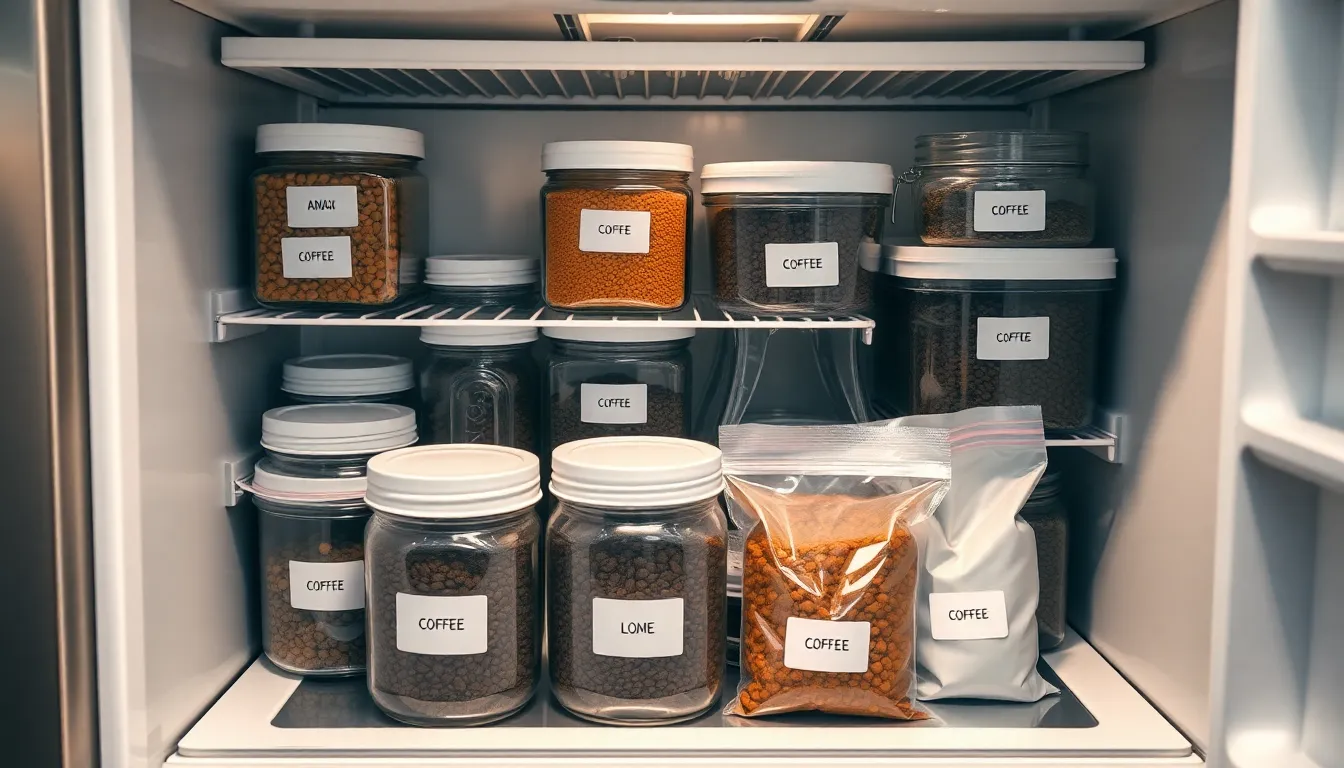
Freezing coffee correctly preserves its flavor and aroma qualities for longer periods. Implementing the right techniques ensures your coffee maintains its distinctive taste profile even after being stored in freezing temperatures.
Optimal Containers for Freezer Storage
Airtight, opaque containers provide the best protection for coffee in the freezer. Vacuum-sealed bags or containers with secure lids prevent air exchange that accelerates staling and flavor deterioration. Glass jars with rubber gaskets offer excellent moisture barriers while preventing unwanted odors from permeating your coffee beans. Mason jars work particularly well for smaller portions of coffee, creating a reliable seal that keeps the freezer environment from affecting your beans. Avoid using paper bags or loosely closed containers that allow air exchange, as these will compromise the quality of your frozen coffee.
Avoiding Moisture and Odor Contamination
Moisture represents the greatest threat to frozen coffee quality, causing beans to degrade rapidly once thawed. Store coffee away from foods with strong aromas like fish, onions, or spices that can permeate even through some packaging materials. Portion your coffee into smaller amounts before freezing to eliminate repeated thawing cycles that introduce condensation. Remove coffee from the freezer and let it reach room temperature before opening the container to prevent moisture from forming on the cold beans. Never store coffee in the refrigerator instead of the freezer, as refrigerators have higher humidity levels and temperature fluctuations that accelerate deterioration. Freeze coffee immediately after purchase or roasting when possible to lock in maximum freshness and flavor compounds.
Signs Your Frozen Coffee Has Gone Bad
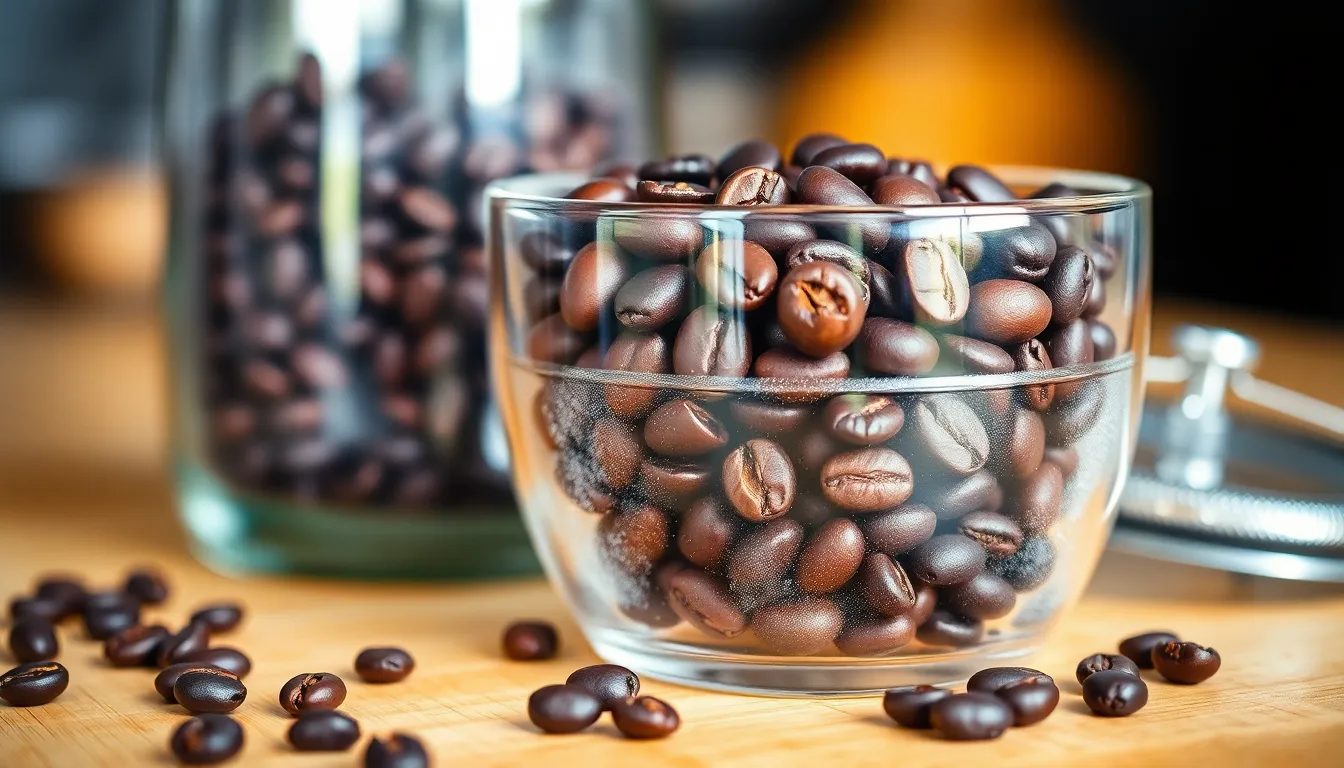
Fresh coffee has a distinctive aroma and flavor profile that noticeably changes when it deteriorates. Your frozen coffee might have gone bad if you observe any of these telltale indicators:
Loss of Aroma and Flavor
The absence of coffee’s characteristic scent signals degradation in frozen beans or grounds. Fresh coffee releases a strong, pleasant aroma that’s immediately recognizable when you open the container. Coffee that smells flat, musty, or lacks its distinctive fragrance has likely passed its prime even though freezer storage. This aroma loss occurs gradually as volatile compounds responsible for coffee’s complex scent profile break down even at freezing temperatures.
Presence of Moisture or Clumping
Condensation inside your coffee storage container indicates improper freezing or thawing techniques. Coffee particles that stick together or form clumps suggest moisture has penetrated the packaging. This moisture contamination accelerates deterioration and creates an environment where mold could potentially develop. Properly frozen coffee remains loose and free-flowing, maintaining its original texture throughout the storage period.
Taste Deterioration
Sour, bitter, or unusually flat-tasting coffee provides definitive evidence that freezer storage has failed. Coffee that produces a cup with off-flavors or lacks its expected richness has deteriorated beyond salvation. The flavor compounds in coffee break down over time, particularly when exposed to air or moisture during freezer storage. A single sip of brewed coffee made from compromised beans reveals quality issues that even the best brewing methods can’t overcome.
Remember that frozen coffee typically maintains quality for exact timeframes: roasted beans last 3-4 months (up to 6 months if unopened and well-sealed), ground coffee deteriorates faster, and brewed coffee can survive up to 2 months in frozen form but with diminishing quality. Once thawed, coffee should be used immediately without refreezing, similar to handling frozen meat products.
Thawing and Using Frozen Coffee Properly
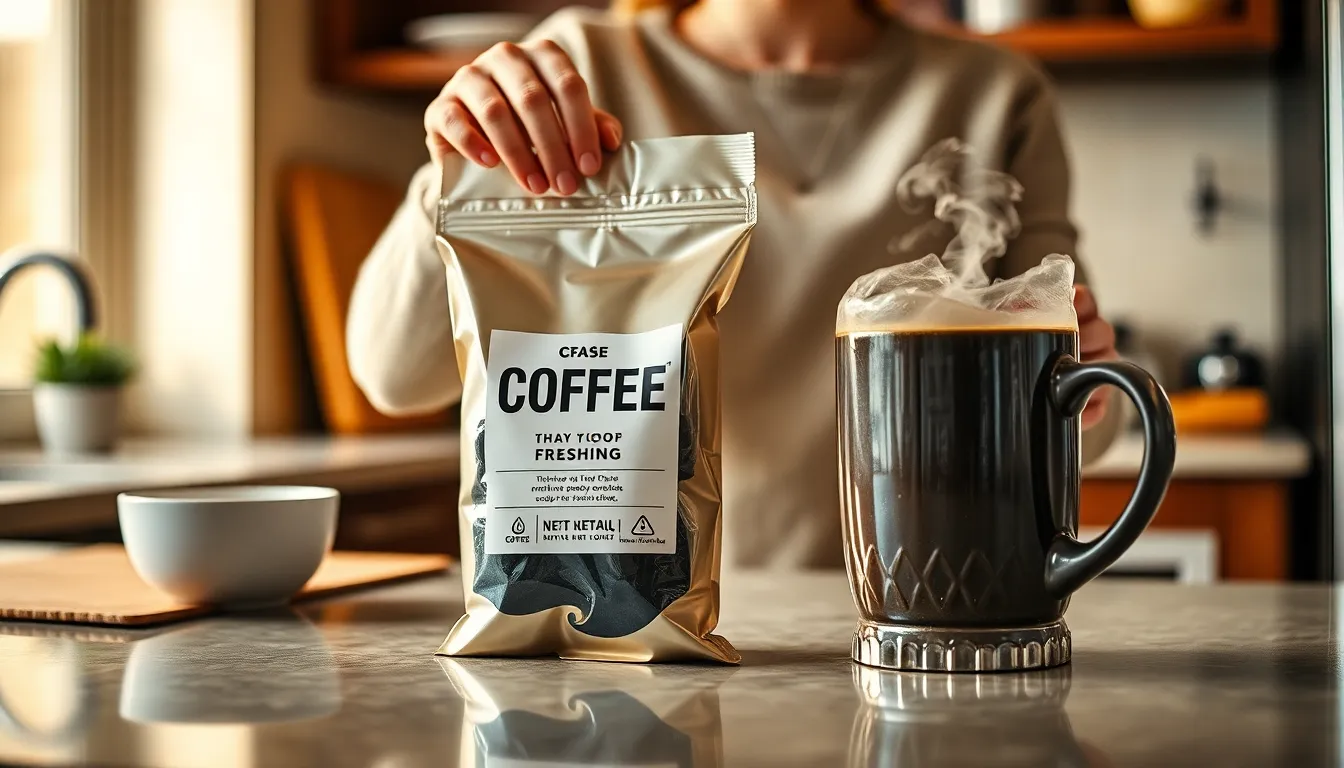
Thawing frozen coffee correctly preserves its flavor profile and prevents moisture damage. Coffee extracted directly from the freezer absorbs humidity, which compromises its taste and aroma. Follow these guidelines to maintain optimal quality when using your frozen coffee supply.
Allow Coffee to Reach Room Temperature
Frozen coffee needs complete thawing before opening the container. Place your sealed coffee package on the counter for about 1-2 hours until it reaches room temperature. This gradual warming prevents condensation from forming inside the package, which would introduce moisture to your coffee. Moisture exposure accelerates staling even faster than oxygen exposure.
Portion Before Freezing
Dividing coffee into smaller portions before freezing offers practical benefits. Package your coffee in daily or weekly serving sizes using airtight bags or containers. This approach lets you thaw only what you’ll use immediately, eliminating the need to repeatedly open and close your main coffee supply. Each portion should be vacuum-sealed or stored in an airtight container to maintain freshness.
One-Time Freezing Rule
Coffee tolerates freezing only once, similar to meat products. Thawed coffee should never return to the freezer, as the freeze-thaw cycle damages the beans’ cellular structure. The moisture accumulated during thawing will degrade flavor compounds if refrozen. Remove only the amount you’ll consume within 1-2 weeks, keeping the remainder frozen until needed.
Immediate Use After Thawing
Ground coffee retains its best qualities for 1-3 days after thawing, while whole beans maintain their flavor for 1-2 weeks. Grind thawed whole beans immediately before brewing to preserve maximum freshness. This approach captures the aromatic compounds that begin dissipating as soon as the bean structure breaks down. Coffee’s volatile compounds escape quickly once exposed to air, so prompt use ensures the richest flavor experience.
Alternatives to Freezer Storage
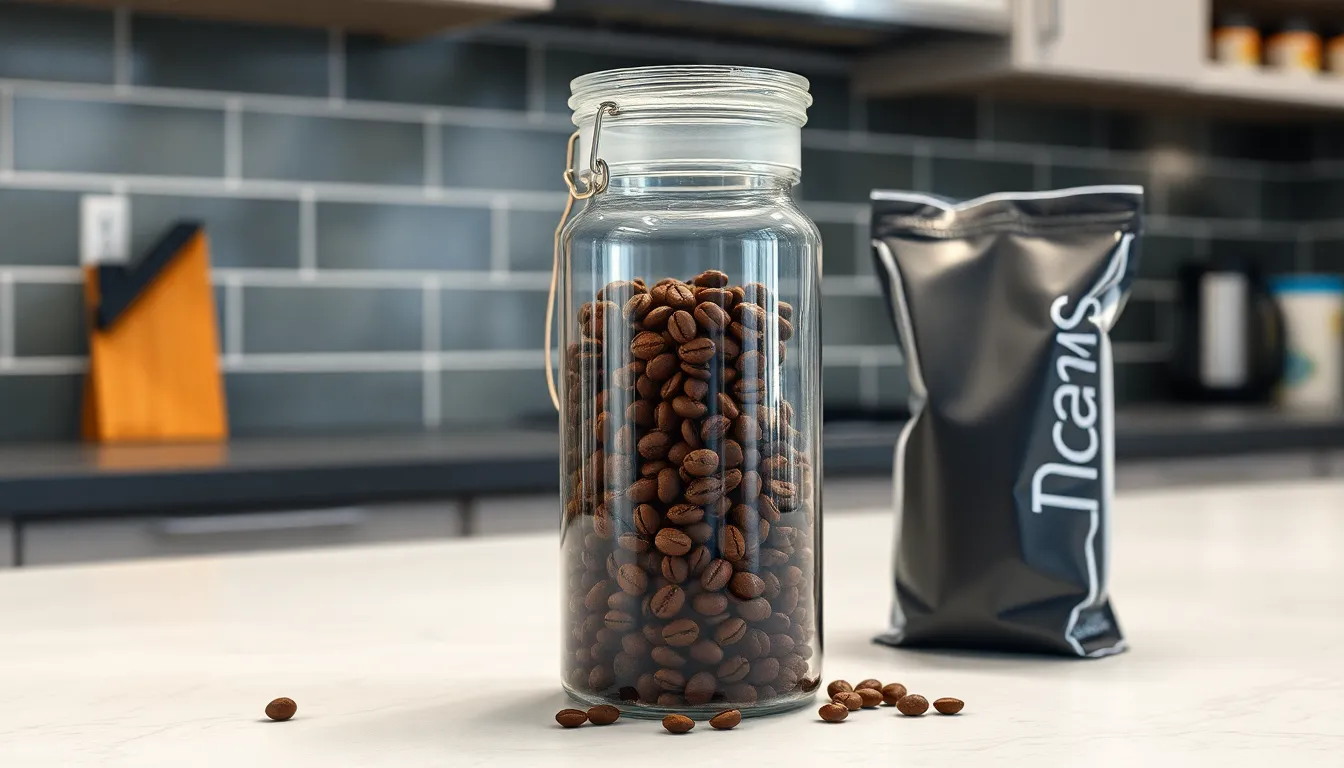
Storing coffee at room temperature offers superior flavor preservation compared to freezing when consumed within a few weeks. Airtight containers protect your beans from their four main enemies: air, light, heat, and moisture. Place these containers in a cool, dark cupboard or pantry away from direct sunlight and heat sources like ovens or stovetops.
Purchase smaller quantities of coffee to maintain optimal freshness without needing freezer storage. Fresh whole beans remain at peak quality for 2-4 weeks after opening when stored properly at room temperature. Ground coffee degrades more quickly, staying fresh for only 1-3 weeks due to its increased surface area exposure to oxygen.
Avoid refrigerator storage for coffee even though its seemingly logical appeal. Refrigerators introduce damaging moisture through condensation each time you open the container. Coffee also readily absorbs odors from surrounding foods, potentially tainting your morning brew with unwanted flavors from last night’s leftovers.
Vacuum-sealed containers provide an excellent alternative for extending coffee freshness. These specialized storage answers remove oxygen that accelerates the oxidation process, helping preserve your coffee’s complex flavor compounds and aromatic oils without freezing.
Conclusion
Freezing coffee can significantly extend its shelf life when done properly. Remember that whole beans outlast ground coffee and proper packaging is essential to prevent freezer burn and moisture absorption.
For best results store your coffee in airtight opaque containers away from temperature fluctuations and only thaw what you’ll use immediately. Once thawed don’t refreeze your coffee and consume ground coffee within days and whole beans within weeks.
While freezing works well for long-term storage you might prefer room temperature storage in airtight containers for coffee you’ll use within a few weeks. The fresher your coffee the better your brew so consider buying smaller quantities more frequently to enjoy optimal flavor without freezer storage.
Frequently Asked Questions
How long can coffee last in the freezer?
When stored properly, ground coffee can last 1-3 months in the freezer, while whole beans can maintain quality for up to 4 months (possibly 6 months if unopened and well-sealed). Brewed coffee can be frozen for up to 2 months but with diminishing quality. The exact timeframe depends on packaging quality, freezer temperature stability, and how frequently you access the coffee.
Why does coffee deteriorate over time?
Coffee deteriorates due to oxidation, which affects its flavor compounds and aromatic oils. Exposure to air, moisture, light, and heat accelerates this process. Freezing slows down oxidation rates, effectively preserving coffee’s quality for longer periods. Whole beans deteriorate more slowly than ground coffee because their intact structure better protects the essential oils and compounds.
What are signs that frozen coffee has gone bad?
Look for loss of aroma (fresh coffee has a distinctive smell that fades), presence of moisture or clumping (which may indicate freezer burn or potential mold growth), and noticeable taste deterioration. If your coffee develops an off smell or flavor, appears unusually damp, or tastes flat when brewed, it’s likely past its prime.
Should I freeze ground coffee or whole beans?
Whole beans preserve better than ground coffee because their intact structure protects essential oils and flavor compounds. If you must freeze coffee, prioritize freezing whole beans when possible. Ground coffee has more surface area exposed to potential moisture and oxidation, making it more vulnerable to quality degradation even when frozen.
What’s the best way to package coffee for freezing?
Use airtight, opaque containers to prevent moisture and odor contamination. Double-bagging techniques provide extra protection against freezer burn. Remove as much air as possible before sealing to minimize oxidation. For best results, portion coffee into smaller amounts before freezing so you only thaw what you need, reducing repeated exposure to air.
How should I thaw frozen coffee properly?
Allow frozen coffee to reach room temperature before opening the container to prevent condensation from forming on the cold beans or grounds. Never refreeze thawed coffee as repeated freeze-thaw cycles significantly damage quality. After thawing, use ground coffee within 1-3 days and whole beans within 1-2 weeks for optimal flavor.
Is freezing coffee better than room temperature storage?
Room temperature storage often offers superior flavor when coffee will be consumed within a few weeks. Fresh whole beans stay at peak quality for 2-4 weeks in airtight containers stored in cool, dark cupboards, while ground coffee remains fresh for 1-3 weeks. Freezing is primarily beneficial for long-term storage beyond these timeframes.
Can I store coffee in the refrigerator instead?
Refrigerator storage is not recommended for coffee. Refrigerators contain significant moisture and strong food odors that coffee readily absorbs. Additionally, the temperature fluctuations when removing and returning coffee to the refrigerator cause condensation that accelerates deterioration. Choose either proper room temperature storage or freezer storage instead.

